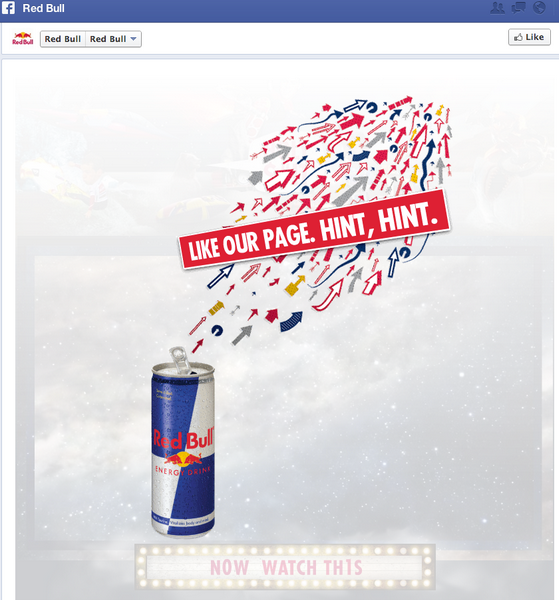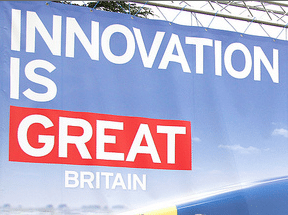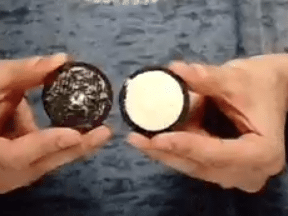Facebook just announced a platform policy change that states it will no longer allow, as of November 5, “like-gating,” the longtime practice of enticing users to like a page by taking advantage of a special offer such as a coupon or contest.

Example of Facebook like-gating page, from Red Bull.
The announcement, which appeared on the Facebook Developer blog, said, “You must not incentivize people to use social plugins or to like a Page. This includes offering rewards, or gating apps or app content based on whether or not a person has liked a Page.”
Facebook explained its rationale by saying it wants people to like Pages because they have a desire to “connect and hear from the business,” not because of “artificial incentives.”
You may recall that, with the introduction of Timeline a couple of years ago, Facebook removed the option for Page owners to designate which tab (now referred to as “apps”) a user interacted with when first visiting the page.
As if these restrictions weren’t bad enough, the fact that organic Facebook Page post reach has hit an all-time low of six percent may cause merchants to wonder whether they should continue using Facebook at all.
5 (Better) Ways to Utilize Facebook for Marketing
With like-gating soon to be a thing of the past, here are five other ways you can utilize Facebook for marketing.
- Engage your fans with relevant content. Content that addresses the wants and needs of your target audience should result in likes, comments, shares and other forms of engagement. It represents a shift toward more authentic relationships and away from the use of gimmicks to build the like count.
- Grow your fan base by using Facebook ads. Smaller businesses with limited budgets may find it difficult to justify spending funds on advertising. However, the reduction in organic reach enforced by Facebook’s algorithm leaves little wiggle room.
You can optimize ad spend by paying attention to Insights, the analytics component tied to your Facebook Page, and promote popular content —posts that have already received likes, comments, and shares. You can also reduce costs by using Facebook’s many targeting options when setting up an ad campaign.
Yet another way to maximize advertising value is through the use of lookalike and custom audiences, which help you reach existing customers and identify new prospects.
- Use other forms of gating access to content. With like-gating soon to be out of the way, merchants can use other forms of gating content that provides more benefit.
Social marketing platform Tabsite offers what it calls “form-gating,” which asks for the user’s name and email address. This makes sense because it provides information that you can use in email campaigns, which is certainly of greater value than a like.
Jim Belosic, CEO of ShortStack, another social marketing platform, advised businesses to collect actionable data — a practice that he calls “action-gating” — such as email addresses, location, age, customer feedback, and other information that is more intrinsically tied to their marketing goals.
“Action-gating a campaign gives businesses the ability to offer incentives in return for information that may be more valuable than a Facebook like. Gathering data such as email addresses can establish long-term communication with customers for little cost,” said Belosic.
- Think outside the Facebook box. With Facebook providing fewer options, it may be time to think more holistically in terms of your online marketing, especially where social media is concerned. This includes making use of up-and-coming social networks such as Pinterest and Instagram.
Another way is to optimize your ecommerce site for social sharing, which you can do by incorporating social sharing buttons on product pages and using customer ratings and reviews.
In a blog post on the topic, Tabsite co-founder Mike Gingerich recommended that businesses stop thinking in terms of Facebook marketing in favor of how your overall marketing fits together.
“This means connecting quality content on your blog and campaigns that capture leads, and then nurturing those leads with email marketing and social media engagement over time to develop a true customer community,” he said.
- Don’t fret over the like. While getting more likes is useful to growing a fan base, it is not the best metric to track in terms of the return on investment, especially when you consider that people can interact with your Page without having to first like it. Reach and engagement are better metrics, and traffic to your website or leads generated using tactics such as form-gating are even better.
Wrap-up
Removing the like-gate is yet another step taken by Facebook to force businesses to advertise. While that may be an unavoidable consequence, you can minimize reliance on ads by creating highly-relevant content, using other methods for gating access to content, and thinking outside the Facebook box toward a more holistic approach to social media marketing.




